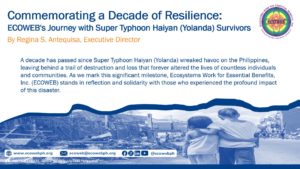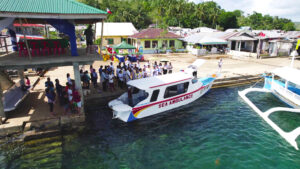The workshop featured a series of activities designed to foster peace and resilience.
Islam comes from the word “Salam”, meaning peace. This principle lies at the heart of a pivotal event that took place on May 25, 2024, at Midway Minkay, Initao, Misamis Oriental. Parents of morits (madrasah students) gathered for a Peace and Resilience Workshop, part of ECOWEB’s “Madaris for Peace and Resilience Project.” This initiative seeks to uplift madrasahs and communities outside the Bangsamoro Autonomous Region in Muslim Mindanao (BARMM) by addressing critical economic and educational challenges and instilling the core value of peace.
Empowering Communities
These Bangsamoro communities have long faced economic hardships and instability, relying heavily on informal economic activities like small-scale trading, agriculture, and fishing. Limited access to resources and poor infrastructures has made it difficult for individuals to generate sustainable income. This lack of formal economic opportunities has also led to a scarcity of skills development among the youth, making them vulnerable to recruitment by extremist groups.
The Madaris for Peace and Resilience Project aims to tackle these issues by promoting economic development, skills training, and peace education. The workshop in Initao was a significant step in this direction, focusing on empowering parents to become agents of change in their communities.
Parents participated in sessions, group discussions, and interactive activities that emphasized the importance of inner peace and its impact on their families and communities.
Cultivating Inner Peace and Community Strength
The workshop featured a series of activities designed to foster peace and resilience. Parents participated in sessions, group discussions, and interactive activities that emphasized the importance of inner peace and its impact on their families and communities. These activities aimed to help participants understand that personal and communal peace is crucial for building resilience against adversity.
Prof. Sorhaila Latip-Yusoph, PhD, a respected peace and resilience expert from Mindanao State University, provided invaluable insights throughout the workshop. Her guidance helped participants grasp the significance of finding peace within themselves and extending it to their families and communities.
Aligning with Project Goals
The workshop was not just an isolated event but an integral part of the broader Madaris for Peace and Resilience Project. By equipping parents with the tools to foster peace and resilience, the initiative supports the project’s overarching goals of economic development and educational improvement.
An essential aspect of the project is the integration of peace education into the madrasah curriculum. This integration aims to complement existing Islamic teachings, fostering an environment where students can learn about peace and resilience in a manner that respects their cultural and religious contexts.
Prof. Sorhaila Latip-Yusoph, PhD, a respected peace and resilience expert from Mindanao State University, provided invaluable insights throughout the workshop.
Addressing Challenges with Cultural Sensitivity
Standardizing the madrasah curriculum and involving parents and guardians as stakeholders are central to the project’s objectives. However, this process must be approached with cultural sensitivity. It is crucial to ensure that any changes made to the curriculum respect the unique cultural and religious contexts of the Bangsamoro communities. Imposing changes without involving the community could lead to resistance and undermine the project’s goals.
“The curriculum revision should be aware of the context. That’s what we really hate – not knowing our context. And it has to be culturally sensitive. When I say culture, you have to decipher and distinguish between three things… you have to bear in mind there are three things you need to consider: Their being Muslims; their being part of the Bangsamoro, and their ethnic affiliations,” Prof. Latip-Yusoph shares.
Prof. Latip-Yusoph emphasized that the curriculum revision should be culturally sensitive, recognizing the distinct identities of being Maranao, Bangsamoro, and Muslim. Understanding these identities is essential for designing and implementing a curriculum that resonates with the community’s values and beliefs. “You have to consider all of this, the cultural belongingness, of these people as you design and redesign the curricular plans that you have,” she adds.
Many madrasahs operate in inadequate facilities with poor infrastructure, which hampers the quality of education.
Building Support Structures for Madrasahs
Beyond curriculum changes, the workshop highlighted the critical need for structural support for madrasahs. Many madrasahs operate in inadequate facilities with poor infrastructure, which hampers the quality of education. Providing proper facilities, effective management, and fair financial support for teachers are essential steps toward improving the educational environment.
Improving the physical infrastructure of madrasahs, ensuring fair wages for teachers, and providing the necessary teaching materials can create a conducive learning environment. A well-supported madrasah can offer quality education, helping students develop the skills and knowledge needed for their future.
Prof. Latip-Yusoph stressed the importance of support in ensuring the success of madrasahs. “I hope these madrasahs will be standardized and well-supported by the government. That is the best way to move forward. The curriculum is just secondary because it’s already there… So long as we don’t stray from Quranic teachings, nobody is going astray. However, if the environment is unpleasant, students will suffer.”
She further illustrated the impact of poor conditions in these madrasahs, sharing a personal experience: “If you live in a toril (stay-in informal Islamic learning facility) and all that you get for breakfast, lunch, and dinner are rice and noodles with no nutritional value, shared among five or ten children, what do you expect? … I’ve experienced this firsthand. I once sent my son to a toril, hoping he would become an aleem. The conditions were so poor that it traumatized him in just one week. I regretted sending him there. This is what happens when torils are not standardized and regulated; they can become abusive. My idea to help madrasahs and torils is to regulate and help them build themselves to meet educational standards.”
A Vision for Empowered Communities
The Peace and Resilience Workshop exemplified the broader objectives of the Madaris for Peace and Resilience Project. It demonstrated the potential for positive change when communities come together under culturally sensitive and well-planned initiatives. By fostering an environment of learning, collaboration, and hope, the workshop laid the foundation for a resilient and peaceful future for Bangsamoro communities.
As the workshop concluded, parents left with a renewed sense of purpose and commitment. They became part of a collective effort to build a better future for their children and communities. The workshop underscored the power of education and collaboration in addressing the challenges faced by Bangsamoro communities. It highlighted the importance of supporting madrasahs and ensuring that they have the resources and infrastructure needed to provide quality education.
The Madaris for Peace and Resilience Project is not just about improving the immediate conditions of madrasahs; it is about creating a sustainable future where Bangsamoro communities can thrive. Through initiatives like the Peace and Resilience Workshop, ECOWEB is paving the way for a brighter, more resilient future for these communities.
| Kin Barkly Tibang


